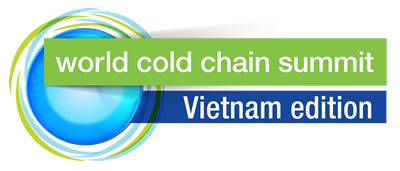With a focus on wasting less food and reducing greenhouse gas emissions from food loss through a strengthened cold chain, Carrier announced that the 2018 World Cold Chain Summit to Reduce Food Loss will be held in Ho Chi Minh City, Vietnam, March 7-8, 2018. Carrier is a part of UTC Climate, Controls & Security, a unit of United Technologies Corp. (NYSE: UTX).
This will be the fourth World Cold Chain Summit organized by Carrier since its inception in 2014 but the first to focus on cold chain development efforts in one specific region. Vietnam, a fast-growing, emerging country, shares many challenges with other developing economies in tackling food waste issues and managing cold chain logistics.
“With new technologies and practices for a more efficient cold chain, significant progress can be made to reduce carbon dioxide emissions, improve cross-border economic activity and help reduce hunger,” said David Appel, president, Carrier Transicold & Refrigeration Systems. “We are proud to convene and engage with experts across private and public sectors to collaborate on developing actionable strategies to help reduce food losses in Vietnam and Southeast Asia.”
The summit will ask food supply chain stakeholders, academics and policymakers to collectively identify significant opportunities in the Vietnamese food supply chain, diagnose root causes leading to losses, and evaluate different cold chain solutions for Vietnam and potentially other developing countries in the fast-growing Southeast Asia region.
These goals are consistent with the Asia-Pacific Economic Cooperation’s (APEC) 2020 aim of reducing food losses and waste by 10 percent, heralded during the 2013 APEC Leaders’ Declaration in Bali and reaffirmed during the 2017 APEC Capacity Building Workshop on Food Losses and Waste Reduction for a Sustainable APEC Food System in Can Tho, Vietnam. The summit also supports the United Nations Sustainable Development goal to halve food loss and waste by 2030.
“We already produce enough food to feed 10 billion people – that’s everyone on the planet today and those expected by 2050,” said John Mandyck, UTC Chief Sustainability Officer and co-author of Food Foolish: The Hidden Connection Between Food Waste, Hunger and Climate Change. “Food loss and waste are hiding in plain sight and represent a new source that could feed 4 billion people, reduce carbon emissions equivalent to all the cars driven each year, and save enough water to meet the annual needs of the entire continent of Africa. Over the course of the past three Carrier World Cold Chain Summits, we have shifted the dialog from the ‘What’ to the ‘How.’”
The United Nations Food and Agriculture Organization (FAO) estimates that one-third of all food produced for human use is lost or wasted each year. The FAO estimates that even if only 25 percent of the global food currently lost was saved, it would be enough to feed 870 million hungry people in the world. As reported by the FAO, food waste ranks as the third largest emitter of greenhouse gas emissions, after the U.S.A. and China.
“Of all the perishable food produced in the world today, only 10 percent is refrigerated,” Appel said. “There is a huge opportunity to cut food waste and improve food distribution by implementing cold chain technology. But to do so effectively, we have to understand local needs, and that’s why we’re focusing this year’s Summit on Vietnam and the Southeast Asia region.”
Vietnam’s food supply chain loses an estimated 5.75 million tons of food per year, accounting for 60 percent of the country’s entire municipal solid waste, according to a 2011 report by Vietnam’s National State of Environment.
Traditionally, the cold chain logistics sector in Vietnam has been fragmented with small and medium service providers that provide localized services that do not cover the end-to-end food supply chain. Broken cold chain logistics is a common occurrence in Vietnam’s food retail market, especially the general trade channels, which comprise traditional wet markets, family grocery stores and street food shops, accounting for 86 percent of total retail value.
In the last 10 years, cold chain capacity in Vietnam has quadrupled and, according to cold chain experts in Vietnam, nearly all cold chain logistics facilities are above 90 percent capacity.
“We believe that it’s not only possible to green the cold chain, but that by better managing the food supply with cold chain technology, we can reduce food loss and waste, feed more people, and reduce greenhouse gas emissions associated with the supply of food,” Appel said. “The goal for the 2018 World Cold Chain Summit is to develop a roadmap to reduce food loss and waste in Vietnam that can also be applied in the APEC region and extended globally.”
About Carrier
Founded by the inventor of modern air conditioning, Carrier is the world’s leader in high-technology heating, air-conditioning and refrigeration solutions. Carrier experts provide sustainable solutions, integrating energy-efficient products, building controls and energy services for residential, commercial, retail, transport and food service customers. Carrier is a part of UTC Climate, Controls & Security, a unit of United Technologies Corp., a leading provider to the aerospace and building systems industries worldwide. For more information, visit www.carrier.com or follow @Smartcoldchain on Twitter.
